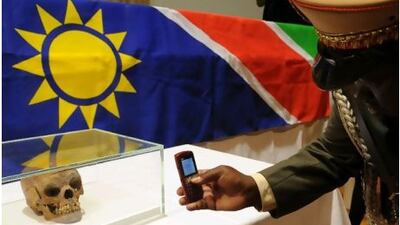BERLIN // German scientists yesterday handed a delegation from Namibia the skulls of 20 people who died in a colonial concentration camp more than 100 years ago - and whose heads were seized for a research project that aimed to prove white supremacy.
The skulls were part of the anatomical collection of Berlin's university hospital, the Charité, and their return has cast a spotlight on a dark chapter of Germany's past. Namibia has been trying to get the remains repatriated since 2008 when a television documentary revealed their existence in the hospital's vaults.
The heads were from four women, 15 men and one boy, age 3 or 4. They fell victim to what historians have described as the first genocide of the 20th century - the suppression by the troops of Emperor Wilhem II of an uprising in which tens of thousands of people from the Herero and Nama tribes were killed between 1904 and 1908.
At a ceremony in Berlin, members of the Charité presented the skulls,
18 in grey boxes and two in glass cases, all surrounded by white flowers, to some 60 representatives from Namibian ethnic groups.
The 20 skulls belonged to Herero and Nama people who died in a prison camp on Shark Island, off the coast of what was then the colony of German Southwest Africa. Scurvy was the cause of death in several cases, tests showed. Some three quarters of prisoners on the island died of malnutrition, poor hygiene and exposure to the elements.
The severed heads, with skin and hair still attached, were sent to Berlin for anatomical research aimed at proving the supposed genetic superiority of white people. The tissue was subsequently removed and the skulls were put in storage in the university's medical archives, along with some 7,000 other skulls from all over the world and dating from various eras.
"The whole heads were separated from the bodies, preserved in formalin and shipped to an anthropologist in Berlin, Paul Bartels, who researched anatomy at Berlin University," said Andreas Winkelmann, who is in charge of the collection of anatomical specimens at the Charité. "He was primarily interested in examining the soft tissues, especially the muscles used in facial expressions. His doctoral students published their research from 1913 to 1915 and when you read it, you get the clear impression that they simply wanted to show that Europeans have finer, more differentiated facial muscles," said Mr Winkelmann. "They interpreted their findings accordingly."
"From today's point of view it wasn't good research, not just because of the context but because of the methodology. It was about 'race' and the idea behind it was that Africans were supposedly more primitive and perhaps closer to apes. That was the aim of this research."
Germany in 2004 apologised for the war in which some 65,000 Herero - most of the 85,000-strong population - and 10,000 Nama were killed, but it has refused demands from descendants to pay compensation, arguing that international laws on the protection of civilians did not exist at the time of the conflict.
It has, however, paid large sums of aid to Namibia.
Members of the Namibian delegation reiterated their demands this week that Germany should pay compensation for the crimes.
For Namibians, the handover of the 20 skulls was a symbolic step in coming to terms with their past and reminding the world of Germany's guilt.
"The repatriation of the skulls gives voice to the dead to tell their own story to the world about how absurd and inhumane German colonialism was towards black communities in Namibia," said the former Namibian ambassador to Germany, Professor Peter Katjavivi.
It was not only scientists who seized human remains in Africa. Adventurers, traders and soldiers also sent back body parts as trophies of their conquests that remain in museum vaults, university archives and private collections in Germany. The University of Freiburg is also examining skulls in its possession that could have come from Namibia.
The director of the Medical History Museum at the Charité, Thomas Schnalke, said: "We acknowledge that German science made itself guilty at the time. We want to apologise for that. We are not the owners of the skulls that were prepared, sent here and researched in questionable circumstances."
He said it had taken years to arrange the handover because the hospital first had to be sure about where the heads came from. The identities of the 20 skulls were not known because no records were kept of the names of the dead. Their origin was determined by examining catalogues in the university archives.
"We are examining further skulls that may have come from Namibia," said Mr Winkelmann. "We can say there will definitely be some more, probably a similar number." In addition, Australian scientists have been working with Charité to identify the geographic origin of possible Aboriginal skulls. They, too, could be returned home.
The skulls at Charité were due to be flown to Namibia on Tuesday and a state memorial service is to be held in the capital, Windhoek, the following day. They cannot be buried according to Namibian tradition because the bodies complete. The remains will then be exhibited at the National Museum of Namibia.

